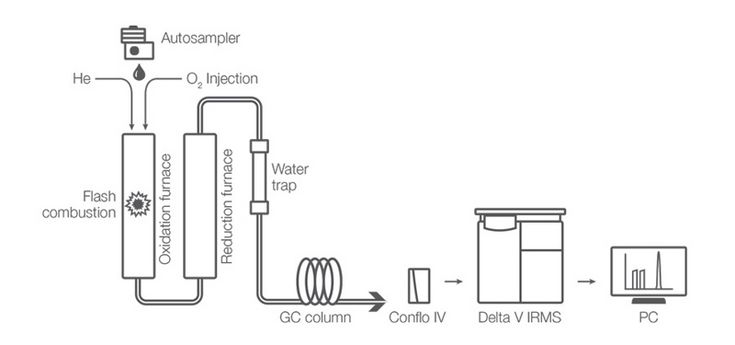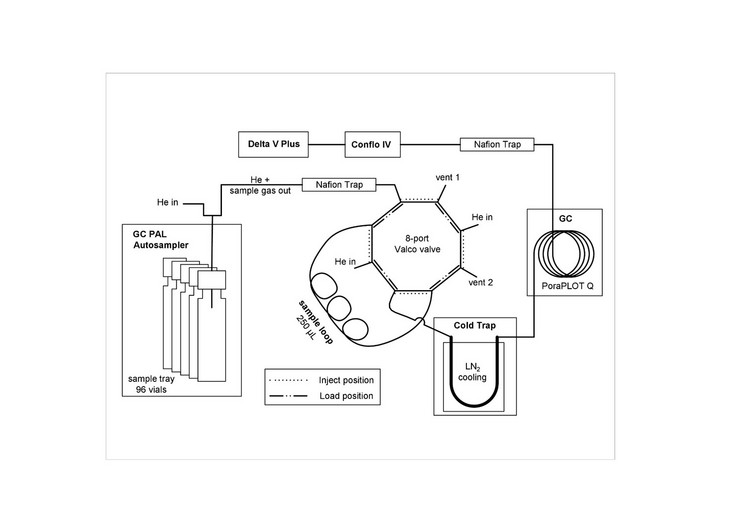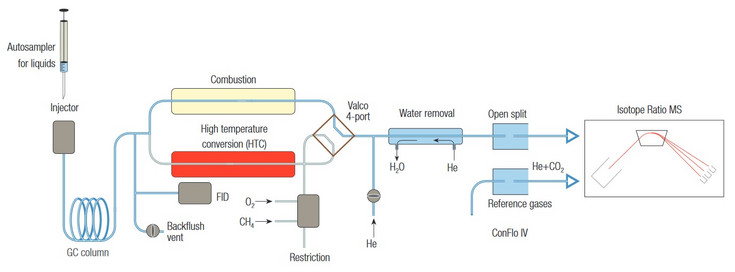Equipment

Laborinfrastruktur
Our core competence is the investigation of biogeochemical processes in the environment by monitoring natural isotope ratios and isotope labels of the bioelements C, H, N, O and S. The isotope methods we use allow us to describe and quantify material flows in ecosystems. This is done in a technical depth that is not achieved by conventional methods.
The working group for stable isotopes (Iso-Group) currently has four mass spectrometers with different peripheries for the determination of isotope ratios for the elements C, H, N, O, Cl and S. The samples are measured against a reference standard and the results are given in promill. A distinction can be made between total and component-specific analysis.
EA-IRMS (Delta V Advantage):
- Elemental analyzer (Thermo Scientific Flash 2000) for sample conversion (gaseous)
- Gas chromatography column (GC) for the separation of individual components
- Continuous flow gas interface (Thermo Scientific ConFlo IV) for flow adjustment and reference gas introduction
- Mass spectrometer (Thermo Scientific Delta V Advantage) for determination of 13C/12C and 15N/14N isotope ratios for (solid) samples
The measurement accuracy is less than ± 0.2 ‰ for C and ± 0.3 ‰ for N.
TC/EA-IRMS (Delta PLUS XP):
- Thermal Combustion Elemental Analyzer (Thermo Finnigan TC/EA, Thermo Quest Flash 1112) for sample conversion (gaseous)
- Gas chromatography column (GC) for the separation of individual components
- Continous flow gas interface (Thermo Finnigan ConFlo III) to adjust the flow and to introduce the reference gas
- Mass spectrometer (Thermo Finnigan Delta PLUS XP) for the determination of isotope ratios 18O/16O, D/H (2H/1H) and 34S/32S for (solid) sample.
The measuring accuracy is less than ± 3 ‰ for H and ± 0,40 ‰ for O.
Continuous flow und Dual inlet-IRMS (MAT253 Plus):
Autosampler-GC-
- Autosampler for liquid injection and Purge & Trap autosampling (Thermo Scientific TriPlus RSH and IMT VSP 4000 Purge & Trap) for sample introduction and preconcentration of analytes
- Gas chromatography (Thermo Scientific Trace 1310) for separation and focussing of analytes
- Oxidation reactor (Thermo Scientific GC Isolink II) for analyte conversion to the IRMS measrement gas CO2
Gasbench/PreCon-
- Autosampler (CTC PAL) and Thermo Scientific Gasbench II for sample introduction, preconcentration, focussing and separation of CO2 and N2O
- Autosampler (CTC PAL) and Thermo Scientific PreCon for sample introduction, preconcentration and separation of N2O and CH4
IRMS
- Thermo Scientific Conflo IV for transferring the CO2 obtained from combusted gaseous analystes and IRMS reference gases to the isotope ratio mass spectrometer (continuous flow)
- Dual inlet for separate measurement of samples versus reference gas (CO2)
- Isotope ratio mass spectrometer (Thermo Scientific MAT253 Plus) for determining the isotope ratios of CO2 and N2O and the clumped CO2 isotope ratios (m/z 44, 45, 46, 47, 48, 49 and 47.5)





